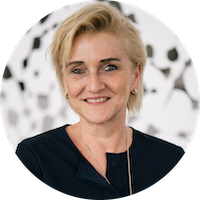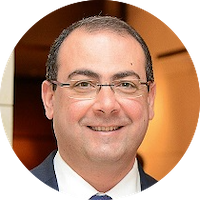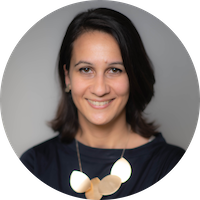A Devex event in partnership WITH the Novartis Foundation
Assessing AI maturity in health:
Maximizing the health impact of transformative technology
June 23, 2021
9 a.m. ET | 3 p.m. CET
WatchAbout the Event
Even before health systems were overwhelmed by COVID-19, many were already facing challenges such as shortages of resources and health workers. But the pandemic has also highlighted just how efficiently health systems can respond to the needs of their population if decisions are made with the right data at hand. As we now face a syndemic — the convergence of several epidemics — access to data is critical to address the emerging needs of those around the globe facing disruption to care.
However, many countries still need to develop the necessary datasets and data infrastructure to make it available and usable. Governments who don’t, risk widening health inequities even further. Low- and middle-income countries have the most to gain from AI, but they also have the most to lose. Therefore, knowing where and how to invest already scarce resources to develop AI and data capacity is crucial. So how can LMICs best invest in AI?
Building on the 2020 report from the Broadband Commission Working Group on Digital and AI in Health, Reimagining Global Health through Artificial Intelligence: The Roadmap to AI Maturity, is a new free online assessment tool that has been developed to help decision makers identify where to best invest resources to enable successful deployment of impactful AI solutions in health. Without this awareness, they risk missing opportunities to leapfrog to the most effective health care solutions.
On Wednesday, June 23, Devex hosted a virtual event in partnership with the Novartis Foundation to explore how countries can best use the tool, lessons learned so far, as well as gauging the potential impact strategic investments in AI could have on population health.
Devex and the Novartis Foundation have partnered around the HealthTech Dialogue Hub initiative. The Hub is a space to transform innovative ideas into impactful health and care solutions. It showcases lessons learned around technology-enabled innovations, hosts events, and facilitates ongoing dialogue between government leaders, health workers, and innovators.
Schedule
9:00 a.m. ET
Welcome & introduction
9:05 a.m. ET
Fireside chat – The AI in health maturity assessment tool: Why does it matter?
Speakers:
-Dr. Ann Aerts, Head, Novartis Foundation
-Dykki Settle, Chief Digital Officer, PATH
9:20 a.m. ET
Panel discussion
Speakers:
-Sunita Grote, Lead, UNICEF Ventures
-Hani Eskandar, Senior Coordinator – Digital Services, Telecommunication Development Bureau, International Telecommunication Union
-Antoine Sebera, Government Chief Innovation Officer, Rwanda Information Society Authority
9:55 a.m. ET
Closing remarks with Jason Shellaby, Director, Global Health Policy, Novartis Foundation
Speakers

Dr. Ann Aerts
Head, the Novartis Foundation
Dr. Ann Aerts is Head of the Novartis Foundation, an organization committed to transform the health of low-income populations, by leveraging the power of data, digital technology and artificial intelligence (AI) to reimagine health and care around the world. Ann holds a Degree in Medicine, a Masters in Public Health from the University of Leuven, Belgium, and a Degree in Tropical Medicine from the Institute of Tropical Medicine in Antwerp, Belgium. Passionate about improving population health through data, digital and AI, Ann applies her relentless commitment to overcoming health inequities to pioneer solutions that can advance health and care globally. Ann chairs the Broadband Commission for Sustainable Development Working Group on Digital and AI in Health and is a member of the International Advisory Board of the Commonwealth Centre for Digital Health. In 2018 Ann served as a member of the US National Academies of Science Engineering and Medicine Committee on Improving the Quality of Health Care Globally and sits on the US National Academies of Medicine Commission on Healthy Longevity. Ann has authored numerous publications on digital health and innovative approaches and multisector partnerships to address global health challenges.

Hani Eskandar
Senior Coordinator – Digital Services, Telecommunication Development Bureau, International Telecommunication Union
Hani Eskandar is the Digital Services Senior Coordinator at the Digital Society Division of the Telecommunication Development Bureau of ITU. He is currently involved in providing assistance to several developing countries by advising on digital applications and services strategies and policies, assisting in implementing technical cooperation projects in areas of digital health, agriculture, governance and education. He has led the development of several guidelines and best practices reports on digital applications particularly on digital Health, digital Agriculture and digital Government. He is currently leading major joint programmes on digital health, digital agriculture, digital government, smart learning and smart villages in collaboration with several governments, UN agencies and other stakeholders.

Sunita Grote
Lead, UNICEF Ventures
Sunita Grote leads the Ventures team within UNICEF’s Office of Innovation and co-founded its Venture Fund. UNICEF Ventures explores how emerging frontier technology can accelerate results for the most marginalized children, including through investments in open source solutions from emerging markets. She steers UNICEF's co-leadership of the Digital Public Goods Alliance, a network of partners who collectively contribute to the discovery, development, and deployment of open source digital public goods. Sunita has a background in innovative financing and previously spent 10 years working in the global HIV and health response based mostly in the UK and in South Asia. She holds an MBA from INSEAD and lives in NYC with her partner and daughter.

Antoine Sebera
Government Chief Innovation Officer, Rwanda Information Society Authority (RISA)
Mr. Antoine Sebera Currently works as the Government Chief Innovation Officer at Rwanda Information Society Authority (RISA), a government authority affiliated to the Ministry of ICT and Innovation that is mandated to coordinate the implementation of the National ICT Agenda toward becoming a knowledge-based society. His work involves driving digital transformation initiatives across many sectors but also playing a catalyzing role in ensuring that innovative technologies are used and there is a strong participation of the private sector especially startups. Mr. Antoine holds a Master of Science in Computer Science & Software Engineering and has over 17 years’ of experience in various sectors of the Information and Communication Technology industry in the both the Government and the Private Sector.

Dykki Settle
Chief Digital Officer, PATH
Dykki Settle has more than 25 years of experience in leadership and development of digital technology, data systems, and their enabling environments in more than 20 countries and global organizations. He is PATH’s Chief Digital Officer and Director of PATH’s Center of Digital and Data Excellence, setting digital transformation strategy for the organization and leading more than 80 staff to deliver a global portfolio of digital and data projects and investments. Dykki is a Commissioner on the Lancet/Financial Times Governing Health Futures 2030 Commission, exploring the convergence of digital health, artificial intelligence (AI) and other frontier technologies with universal health coverage (UHC) to support attainment of the third Sustainable Development Goal (SDG). He also chairs the board of Digital Square, the USAID/BMGF-funded PATH-led flagship global project for digital health supporting more than 40 implementing partners and over 20 open source software global goods used by almost every country in Africa, South Asia and Southeast Asia.

Jason Shellaby
Director, Global Health Policy, Novartis Foundation
Jason Shellaby is the Director of Global Health Policy at the Novartis Foundation (NF). During his time at NF, Jason has led several global health initiatives, including the national scale-up of a telemedicine program in Ghana and the management and policy integration of urban hypertension programs in Senegal, Ghana and Vietnam. Prior to NF, Jason served as Director of External Affairs at Village Health Works, supporting the scale up and capacity building for health care facilities in Burundi, East Africa and managing the NYC office. He was a Program Fellow at the Clinton Global Initiative, and worked on the Environmental Initiatives team at the World Economic Forum. Jason holds a BA in International Relations from Tufts University, an MA in International Affairs from The Graduate Institute of International and Development Studies, and an MSc in Global Health Policy from the London School of Hygiene and Tropical Medicine.

Catherine Cheney
Senior Reporter, Devex
Catherine Cheney is a Senior Reporter for Devex. She covers the West Coast of the U.S., focusing on the role of technology, innovation, and philanthropy in achieving the Sustainable Development Goals. And she frequently represents Devex as a speaker and moderator. Prior to joining Devex, Catherine earned her bachelor’s and master’s degrees from Yale University, worked as a web producer for POLITICO and reporter for World Politics Review, and helped to launch NationSwell. Catherine has reported domestically and internationally for outlets including The Atlantic and the Washington Post. Outside of her own reporting, Catherine also supports other journalists to cover what is working, through her work with the Solutions Journalism Network.


